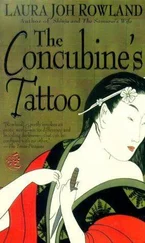Laura Rowland - The Iris Fan
Здесь есть возможность читать онлайн «Laura Rowland - The Iris Fan» весь текст электронной книги совершенно бесплатно (целиком полную версию без сокращений). В некоторых случаях можно слушать аудио, скачать через торрент в формате fb2 и присутствует краткое содержание. Год выпуска: 2014, ISBN: 2014, Издательство: St. Martin, Жанр: Исторический детектив, на английском языке. Описание произведения, (предисловие) а так же отзывы посетителей доступны на портале библиотеки ЛибКат.
- Название:The Iris Fan
- Автор:
- Издательство:St. Martin
- Жанр:
- Год:2014
- ISBN:9781466847439
- Рейтинг книги:3 / 5. Голосов: 1
-
Избранное:Добавить в избранное
- Отзывы:
-
Ваша оценка:
- 60
- 1
- 2
- 3
- 4
- 5
The Iris Fan: краткое содержание, описание и аннотация
Предлагаем к чтению аннотацию, описание, краткое содержание или предисловие (зависит от того, что написал сам автор книги «The Iris Fan»). Если вы не нашли необходимую информацию о книге — напишите в комментариях, мы постараемся отыскать её.
The Iris Fan — читать онлайн бесплатно полную книгу (весь текст) целиком
Ниже представлен текст книги, разбитый по страницам. Система сохранения места последней прочитанной страницы, позволяет с удобством читать онлайн бесплатно книгу «The Iris Fan», без необходимости каждый раз заново искать на чём Вы остановились. Поставьте закладку, и сможете в любой момент перейти на страницу, на которой закончили чтение.
Интервал:
Закладка:
Akiko turned, her face a picture of guilty defiance.
“I told you not to feed stray dogs,” Reiko said. “We can’t afford it.”
“I saved them some of my food.”
Reiko hated to criticize her daughter’s generosity, especially since caring for dogs was a virtue. The shogun had enacted laws that protected dogs and built kennels for them. Anyone caught killing or hurting dogs received the death penalty. A priest had once told him that his mercy would please the gods, who would then grant him an heir. Under his laws the population of stray dogs roaming Edo had exploded. The fierce, wild animals scared Reiko.
“They’ll bite you,” she said.
“No, they won’t. They’re my friends.”
Reiko was caught between her need to discipline and protect her child and her wish for Akiko to be happy. She knew Akiko was lonely. Chiyoko was too young to be a close friend, Tatsuo preferred to play by himself, and Akiko’s bold ways didn’t endear her to the neighborhood girls who shunned her because her father was in disgrace. When they teased her, she hit them. Reiko herself had been unpopular as a child, neither able nor willing to fit in with the conventional girls of her social class. She’d been fortunate that her father, Magistrate Ueda, had occupied her with education, martial arts lessons, and listening to trials in his court. But Reiko’s attempts to teach Akiko ended in fights, Sano didn’t have time, and there was no money for tutors. Akiko had turned to these dogs for company and diversion.
Something had to be done about her, Reiko thought. Then she heard noises from the front of the house. Sano and Masahiro had come, at last. She’d been in a fever of impatience to see them ever since she’d heard the news about the shogun. She dreaded talking to Sano because every conversation turned into an argument, but she wanted to find out what had happened. Reiko closed the back door, leaving Akiko with the dogs, and hurried to the entryway.
* * *
Sano’s heart lifted, its habit whenever he saw his wife. Then it fell like a bird with a net thrown over it, dragged back to earth by their troubles. Reiko was as beautiful as when they’d married nineteen years ago, but she was thinner, and silver threads glinted in her upswept black hair. She didn’t smile at Sano across the distance created between them by his campaign against Lord Ienobu. Sano felt lonely in her presence.
“Are you all right?” Reiko asked. She was cool toward Sano; her concern focused on Masahiro.
The zest Masahiro had shown during the investigation turned to sullenness. “I’m hungry.”
“Your breakfast is ready,” Reiko said.
“I’ll eat it in the kitchen.” Masahiro hung his swords on the rack, tossed his cloak on a hook, and stomped off.
It wasn’t like Masahiro to be rude to his mother. Sano noticed a new tension between his wife and son. Masahiro didn’t like the estrangement between his parents and avoided being with them, but this was something different. “What’s wrong with him?”
“I’ll explain later.”
Reiko helped Sano remove his cloak, careful not to touch him. They never touched except accidentally. They hadn’t had sexual relations in two years. She’d spurned his advances until he’d given up. She’d said she didn’t feel well, but Sano knew the real reason: She wasn’t in love with him anymore because his actions had put them in danger, reduced them to poverty, and ruined their children’s prospects. He was still in love with her despite her disapproval of him, and he felt rejected, less than a man, and miserable. He also couldn’t help feeling angry.
She knew these were hard times for him, too, yet she denied him the comfort of physical intimacy and sexual release. Would it kill her to accommodate him once in a while? He would never go outside their marriage for sex, although it would be his right; many husbands did.
They went into the parlor, which was chilly despite the charcoal brazier. The alcove, decorated for the New Year, contained a table set with ferns in a porcelain vase and painted wooden lobsters-symbols of good fortune-and rice cakes topped with oranges-bribes to make evil spirits go elsewhere. If only the rituals worked, Sano thought as he sat by the brazier and thawed his hands.
Reiko put his breakfast on a tray table in front of him. Sano was starving; he hadn’t eaten since dinner yesterday. Devouring rice with fish, pickles, and tofu, washing it down with hot tea, he felt guilty because Reiko bore the brunt of his demotions. Raised as a privileged member of the upper class, she’d never had to do housework for most of her life. Now they had so few servants that she cooked, waited on the family, and washed clothes. She wore cotton garments because her pretty silk kimonos had worn out and Sano couldn’t afford to replace them. She never complained, but he knew she minded-and it wasn’t because she was spoiled and resented having to work. It was because he’d willingly, despite the consequences, kept up the campaign against Lord Ienobu, and his honor always took priority over her wishes and their family.
“What happened last night?” Reiko asked.
He’d done more things that he knew would upset her and jeopardize what was left of their marriage. Sano started his tale with the confrontation on the highway.
Reiko leaned away from him. Her eyes filled with reproach. “You didn’t tell me you’d had a tip about Lord Ienobu’s men.”
Four years ago Sano wouldn’t have kept it a secret from her. Back then, since the early days of their marriage, they’d shared everything. Reiko, a unique woman and unconventional wife, had loved helping him with his investigations. The only child of one of Edo’s two magistrates, she’d grown up listening to trials, and she’d developed an interest in crime and a flair for detective work. Sano had come to rely upon her help. Although they’d often disagreed on aspects of their investigations, they’d never disagreed about whether to pursue a murderer … until the case of Lord Ienobu. Sano wanted to continue. Reiko didn’t. They’d had many arguments about it, but neither could change the other’s mind. Their discord was complicated by other problems, one of which was that Reiko’s father had been forced to retire after Sano had run afoul of Lord Ienobu. Now here came another argument, the last thing Sano wanted, that he’d tried to avoid by not telling Reiko about the tip.
“I didn’t know if the tip was any good,” Sano said. “I had to investigate it first.”
“You could have told me you were going after them last night.” Reiko spoke in a controlled, civil voice.
“I didn’t want to upset you,” Sano said.
“So you let me think you were out on your regular patrol? Then Detective Marume comes home alone, covered in blood?” Reiko exclaimed, “Well, I’m upset now!”
“I’m sorry,” Sano said, keeping his voice low, hoping Reiko would follow suit. The house was so small; words spoken in one room were audible everywhere else. “I didn’t know what would happen.”
“Things always turn out badly when you take action against Lord Ienobu.” Reiko repeated what she’d been telling Sano for years: “It’s time to give up trying to prove that Lord Ienobu was responsible for Yoshisato’s murder.”
At times like this Sano wished she were a conventional wife who never criticized or opposed her husband. Her strong, independent will had attracted him to Reiko when they were first married, but he didn’t like having it turned against him; yet he had only himself to blame. He’d endangered what was left of their life together. What did she see when she looked at him? Surely not the dashing samurai she’d married, but a misguided fool.
“It’s a matter of honor,” Sano retorted.
Читать дальшеИнтервал:
Закладка:
Похожие книги на «The Iris Fan»
Представляем Вашему вниманию похожие книги на «The Iris Fan» списком для выбора. Мы отобрали схожую по названию и смыслу литературу в надежде предоставить читателям больше вариантов отыскать новые, интересные, ещё непрочитанные произведения.
Обсуждение, отзывы о книге «The Iris Fan» и просто собственные мнения читателей. Оставьте ваши комментарии, напишите, что Вы думаете о произведении, его смысле или главных героях. Укажите что конкретно понравилось, а что нет, и почему Вы так считаете.












